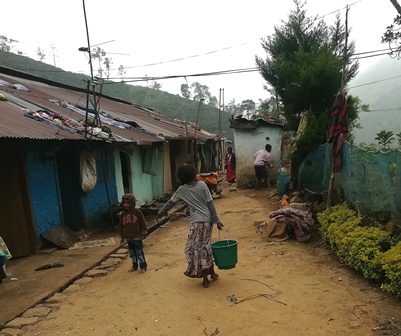By Piyumi Fonseka/Daily Mirror
I was holding onto the wall while taking off my shoes to enter another house of a tea estate worker, Jeyarani, in Nuwara Eliya. A piece of cement suddenly broke off from the wall I was holding onto.
There were many gaping cracks on the walls of Jeyarani’s house. Her attempt to cover the bigger cracks with cow dung seemed to be merely a temporary solution.
Jeyarani is Tamil, and is married to a Buddhist. Her house has a leaking roof made of corrugated iron sheets. Its weak and cracked walls do not provide safe shelter for her family comprising husband, two young daughters and a son.
Poor sanitation, the absence of piped water and a proper toilet add to her difficulties.
Even after living for nearly two centuries in Sri Lanka since their arrival from South India, during British rule, the Indian origin tea estate workers still live in a poor condition trapped in an unchanging socio-economic life.
Delving into the living conditions of estate workers one quickly finds out that the level of income plays a vital role. A majority of estate sector workers are not paid a sufficient living wage that meets their basic requirements.
Congested Houses
The Daily Mirror witnessed that most of the traditional line rooms of tea estate workers are very small – 10x 10 feet in size – the same as they were many decades ago. Very few line rooms have been upgraded or reconstructed by the estate or the workers.
In almost all the line rooms the Daily Mirror visited, the father, mother, adult sons, daughters, grandparents and married members of the family live packed like tea in a tea packet. The space within the tiny line rooms is used for sleeping, eating, living and all other purposes.
“Men, women, young daughters and young sons all live in one room. These daughters cannot even change their clothes inside the house,” she Jayarani said.
There are seven members in Sinnathambi’s family living in a house measuring just 10×10 feet. Fifty-four-year old Sinnathambi is a worker at Badulla Wewessa Tea Estate.
“We face various difficulties in living in this tiny space. Along with our children and grandchildren, there are a seven people living in our house. Some people are capable of upgrading their line rooms with the permission of the estate owners, but we struggle to meet even the daily expenses,” he complained.
Many houses do not have electricity. They do not have adequate latrine facilities. Most of the latrines aren’t properly maintained. “The neighbors and we share the same latrine,” Sinnathambi said.
There is no space between two line rooms because a single wall divides two houses. “Politicians do visit our houses before every election and make promises to reconstruct the line rooms. But we are fooled and keep voting for them. After winning the elections, they forget the promises made to us”, Sinnathambi said.
However, there has been some progress. House upgrading programs have been launched by the Government and NGOs from time to time. Improvements have been made to kitchens and roofs. But even the upgraded houses are too small for the number of inmates.
Deprived of Land Rights
The ownership of the line rooms or land on which they are built are not given to the resident family although they have been living there for generations, said Kamalaraj, a tea estate worker in Walapan. The estate authorities deny them the fundamental right to own land. He also said that their community is always under threat of eviction by the estate owners.
M.P. Baskaran (60), another tea estate worker from a Walapane, said that although he has been serving the estate all his life and living in the provided line room since birth, he owns neither the house nor the land.
“There is nothing in my name. We earn money and spend it for our daily needs. We are in a situation where we cannot think of escaping from this poverty or at least taking our children out of this pathetic lifestyle, “ Baskaran said.
“With a number of families living in the same house, imagine the difficulties they face every day. They have no place to go. All of them have to live together amid hardships because they have no option,” Baskaran added.

Indebted for generations
Recent studies have shown that compared to other sectors in Sri Lanka the estate sector has an increasing problem of indebtedness. There is virtually no saving. Household expenditure routinely exceeds their income.
“Even though we want to save for our children’s future, we cannot,” said female tea worker B. Sumathi said.
The parlous financial situation of most estate workers has pushed them towards indebtedness. Sumathi told us that this situation is common with almost all the estate sector workers. They are indebted for generations.
“We have bank accounts not for saving purposes. We get our salaries through those bank accounts. So, we use them just for transaction purposes,” Sumathi said.
Alcoholism
Alcoholism is rampant in the estates. In every household the complaint is that the men spend too much on drinks. Kamalaraj, a breadwinner of a family of eight, from Nuwara Eliya said that he is unable to start work without a dink or two. Despite their poor financial condition, drinking is a compulsive habit and drinks are downed every day.
Contributions to Trade Unions
There are around five main trade unions operating in the estates. every tea estate worker is supposed to pay Rs.150 per month as his contribution to the trade union he is a member of. Even the Ceylon Teachers’ Union, one of the main trade unions in the country, charges only Rs.20 per month from every member.
Estate worker Ranjan (43) from Walapane criticized the estate trade unions for charging Rs.150 from their salaries every month.
“How unfair and inhumane it is to snatch such an amount of money from our monthly salaries and not do anything for our betterment? We cannot avoid that payment. By collecting Rs.150 from each and every worker, these trade unions are making millions every month. Do they spend that money to do anything for us? No,” Ranjan said.
Social Discrimination
The social status, recognition and respect for estate workers are other issues. The line room residents who were interviewed revealed that they get lower social recognition compared to others if they revealed their line room identity.
“I think it is all in the minds of other people. We are discriminated against when we tell them where we live. We have been branded as Layme ayo (Tamils in line rooms). When we visit a Government institutions, officials refuse to help us and instead ask us to go to the estate owners because we belong to them,” Jeyarani lamented.
Stagnant Lives
According to the opinion of sociologist Prof. Siri Hettige, there are two main reasons as to why the living conditions of tea estate workers are stagnant.
He was of the view that lack of investment on research in the tea plantation sector, despite having a dedicated research institute for tea, is one of the main reasons for the downturn in the industry.
“The tea industry as a whole is on the brink, decreasing the turnover of plantation owners,” he said.
Absence of technological improvements that could have increased productivity is another reason for the parlous state of the estate sector.
“Due to the above reasons, estate owners might not be making huge profits to distribute to the workers,” he said.
However, he said that the issues faced by the estate workers should not be confined to the companies. “The solution requires a joint effort by both the Government and the companies,” he suggested.
There should be a scheme similar to the Government’s Samurdhi programme for low-income households, a programme which was introduced to eliminate extreme poverty, in other parts of the country, Hettige said.
Better living conditions impact productivity
Research done by Ajantha Kalyanaratne, senior lecturer in Economics at Sri Jayawardanepura University, has revealed that the productivity of a tea estate worker living in an improved house goes up by 150%, as a worker living in a traditional line room is vulnerable to health issues.
Improving the living conditions of tea estate workers would benefit both workers and the companies.
In spite of the harsh reality they face, there was a smile on every worker’s face. These tea plantation workers still have dreams and wish to change their lives. Let this article be a stark reminder to the authorities to open their eyes and do the needful. In order to find a solution for the workers’ issues, an effective dialogue should take place involving different parties, including the estate owners, trade unions, workers and the government.
(Photos are by author Piyumi Fonseka)






























































